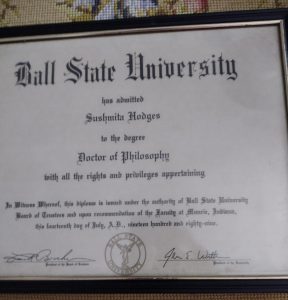Most people associate the title “Doctor” with those who work in healthcare. However, for Upper School history teacher Sushmita Hodges, this title was about history. Hodges’s journey to her doctorate in history started when she was in high school. She always felt like history was something she could be successful in and would continuously pursue.
Her curiosity about the past bloomed early, as she was captivated by the stories of ancient civilizations, the patterns of social evolution and the way history shaped the present. “So that’s when my interest, and if you will, my relationship with history started when I was about a little bit older than you guys, at age 16,” she said. “I was always interested in history, […] because of how I did in high school.”

That spark of passion followed her throughout her academic life and helped set her up for success. “I got my BA honors in history. I got a master’s in history from Delhi University, and then eventually I came to the United States to get a PhD,” Hodges said.
However, Hodges’s journey was not straightforward. As a young woman in academia, especially in history, she encountered numerous challenges—some expected, others not. She had to navigate the cultural differences between India and the United States. Yet, despite these challenges, her commitment to history never wavered.
When she arrived in the United States, she faced many challenges, but the opportunity for growth was undeniable. “I applied to a state school in Indiana for reasons that everybody does, where there is family. And I had my aunt at the time, who was a professor at Ball State University in Muncie, Indiana,” she said, reflecting on how family connections helped anchor her as she adjusted to a new life abroad.
However, not everything went smoothly upon her arrival. One particular incident stands out regarding her acceptance into the PhD program. “This gentleman, who was the director, decided to count exactly the number of years I had, and he basically said that he wouldn’t get me into even the master’s program because I had only 11 years of high school and three years of my undergrad, which was an honors program in one of the most elite institutions in India that people compete to get into across the country.” Despite her credentials, the director insisted that she must complete a two-year master’s program at Delhi University before she could be eligible for the PhD program at Ball State.
Her path was not easy, but her aunt—a strong, determined woman—stepped in to help. “My aunt, a very feisty woman, was also in the academics, and she had got her PhD in the 50s. She was a professor at Calcutta University before she came here as a visiting professor. She then got hired to teach at Ball State after being in Bellingham, Washington. She basically, you know, she fought on my behalf,” Hodges recalled. With her aunt’s determination and support, she was able to push through the challenges and continue her academic journey.
To her, history was not just something to be studied; it was something to be understood and shared. It was about learning from past mistakes and triumphs to shape the future. Thus, Dr. Sushmita Hodges continues her journey as a historian with passion and perseverance, serving as an inspiration for future generations.
Updated 3/11 to add Podbean recording